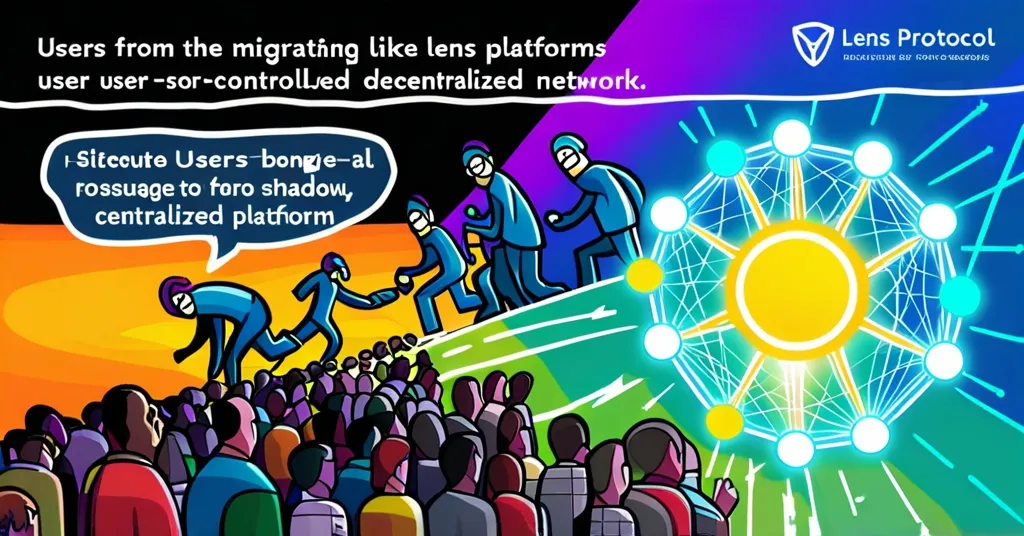Social Media Shifts: Big Tech Challenged by Decentralized Platforms like Lens Protocol

Social Media’s Exodus from Big Tech: Embracing Decentralized Futures
Users are increasingly vocal about their frustrations with Big Tech’s control over social media. Platforms like Instagram, Facebook, X, and TikTok, once the undisputed kings of social networking, are now facing a formidable challenger: decentralized social media networks powered by blockchain technology. These new platforms promise to revolutionize the way we interact online, offering users greater control over their data and content.
- Big Tech platforms track and monetize user data
- Censorship and control prevalent in centralized social media
- Lens Protocol and SocialFi offer decentralized, user-owned solutions
- Avara secures $31 million to expand Lens Protocol before mainnet launch
Traditional social media platforms are built on a foundation of data collection. Every click, like, and share contributes to a vast dataset that companies like Instagram and Facebook use to target ads. Kamala Harris’ campaign, for instance, spent over $11 million on Instagram and Facebook ads to reach younger voters, showcasing the lucrative nature of user data. This pervasive tracking means our digital footprints are more valuable than we might think.
However, the issue extends beyond mere data monetization. Big Tech’s control over content has come under fire, particularly when platforms like Facebook and Google censored posts related to an attempted assassination of President Trump. Such actions highlight the immense power these companies hold over information flow, often swayed by political and commercial interests.
In contrast, decentralized social media platforms like Lens Protocol offer a refreshing alternative. Lens Protocol, a decentralized system built on blockchain technology, allows users to own their social media data and profiles. This means users can move their digital lives across platforms without fear of censorship or control. It’s like switching your phone number between carriers, but for your entire social media presence.
Avara, the visionary force behind Lens Protocol, recently secured a $31 million funding round led by Lightspeed Faction. With additional investments from entities like Alchemy, Avail, Circle, Consensys, DFG, Superscrypt, Re7, and Wintermute Ventures, Avara is poised to expand its network ahead of the eagerly awaited mainnet launch. This funding not only validates the project’s potential but also signals a growing investor interest in decentralized solutions.
The concept of SocialFi, which blends social media with decentralized finance, lies at the heart of this revolution. As
“SocialFi gives users a new perspective on how decentralization can provide a more value-driven experience.”
it seeks to redistribute value more equitably among users, moving away from Big Tech’s profit-centric models. Platforms like Steemit, Mirror.xyz, and Farcaster are already demonstrating SocialFi’s potential to empower users and creators, despite facing challenges in scalability and user experience.
Imagine a world where your social media profile isn’t just a collection of posts and likes but a valuable asset you own and control. That’s the promise of decentralized social media. Yet, this promise comes with hurdles. Scalability, security, and regulatory compliance are significant challenges that developers must navigate for these platforms to thrive. However, the movement towards decentralization is fueled by a desire for privacy, freedom, and a fairer distribution of the value generated by user engagement.
The future vision for social media is compelling: a landscape where users are not just passive consumers but active participants with ownership and control over their digital lives. The shift towards SocialFi and platforms like Lens Protocol could mark the beginning of a new era, one where the power of social media is in the hands of the many, not the few.
Key Takeaways and Questions
- What are the main issues with centralized social media platforms?
Centralized platforms track and monetize user data, censor content, and influence user behavior through targeted ads and influencer content.
- How does decentralization address these issues?
Decentralization through blockchain technology allows users to own their content and data, reducing the risk of centralized control, censorship, and data exploitation.
- What is Lens Protocol and how does it work?
Lens Protocol is a system built on blockchain technology that helps social media work more efficiently and securely, enabling users to own their social media profiles and move their data across platforms without relying on centralized authorities.
- What is the future vision for social media according to the article?
The future involves SocialFi, where users are compensated for their contributions, and value distribution is more equitable among participants rather than being concentrated in the hands of centralized corporations.



